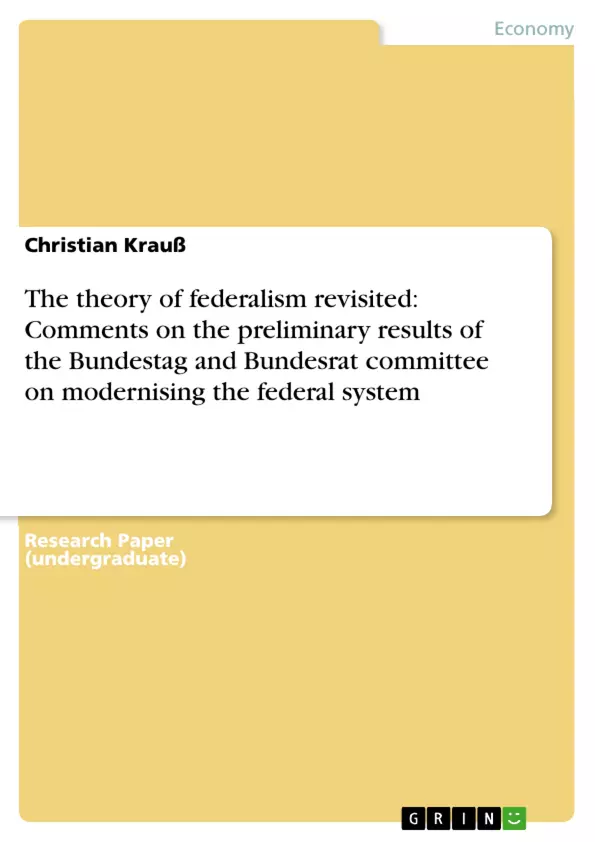The term federalism derives from the Latin word “foedus” and is rendered in the words “alliance” and “treaty” or “agreement”. Federalism describes a national form of organization consisting of at least two members, who are joined together by means of a voluntary agreement or treaty into a unitary state having its own national characteristics,1 but without discarding the distinctive national attributes. Through this coalition the individual / federal states surrender their jurisdiction and individual powers to the unitary state. In return, the federal system makes sure that the unitary state and the individual states control and assist each other mutually when fulfilling their obligations.2 Federalism is especially characterized in that assignments, revenues and expenses are distributed on several national levels.3 Furthermore, federalism must safeguard a certain unit from a (foreign) political, economic, military and socially cultural point of view.4
Basically, federalism implements an equilibrium between decentralization and centralization.5 Aided by expenses and the division of assignments, revenues and expenditure, an optimal allocation is put from theory into practice.6 In Germany, the 16 federal states (Länder) make up the federal state, the German Federal Republic. Powers to and responsibility for national assignments in the government and governmental management, legislation and the administration of justice is divided between the federal state and the individual states. The German constitution ensures that in addition to this vertical division between the federal and the individual states’ authorities, a horizontal division of powers exists between the legislative, executive and judicial branch, thereby forming the basis of a double division of powers.7
Current discussions concerning the German federal reform, more precisely defined the so-called “Kommission von Bundestag und Bundesrat zurModernisierung der bundesstaatlichen Ordnung”8 are mainly centred on the reorganization of the assignments of the federal and the individual states. In the course of these discussions special attention is paid to the reorganization within the areas of powers and responsibility of both levels, especially regarding education, representation of EU-countries, a readjustment of the extent of the laws, which the federal state is obliged to approve, and the equalization of tax rates between the federal states.
Inhaltsverzeichnis (Table of Contents)
- INTRODUCTION.
- REASONS FOR FEDERALISM
- ALLOCATIVE ASPECTS.
- DISTRIBUTIVE ASPECTS..
- ASPECTS CONCERNING STABILIZATION.
- ASPECTS OF GENERAL POLITICAL NATURE
- AIMS FOR THE FEDERALISM REFORM
- INTERNAL GERMAN AIMS.
- AIMS FOR THE WHOLE OF EUROPE..
- CONCLUSION
Zielsetzung und Themenschwerpunkte (Objectives and Key Themes)
This study aims to provide a comprehensive analysis of the theory of federalism, focusing specifically on the ongoing reform discussions regarding the German federal system. It examines the rationale behind federalism, the goals of the proposed reform, and the key areas of contention within the debate.
- The theoretical foundations of federalism
- The allocation of powers and responsibilities between federal and state levels
- The impact of federalism on economic efficiency and political stability
- The challenges and opportunities of reforming the German federal system
- The role of federalism in the context of the European Union
Zusammenfassung der Kapitel (Chapter Summaries)
- Introduction: The study begins by defining federalism and its historical roots. It then outlines the specific context of the German federal reform debate, highlighting the key issues under discussion.
- Reasons for Federalism: This chapter explores the theoretical arguments for federalism. It delves into the allocative, distributive, and stabilization aspects, as well as general political considerations that support a federal system.
- Allocative Aspects: The chapter examines the role of federalism in achieving economic efficiency. It highlights the importance of decentralization in promoting structural and cost efficiency.
Schlüsselwörter (Keywords)
The study centers on the key concepts of federalism, decentralization, allocation, distribution, stabilization, German federal system, federal reform, European Union, and political efficiency.
Frequently Asked Questions
What is the basic definition of federalism provided?
Federalism is a national organization where at least two members join via a voluntary agreement into a unitary state while keeping their distinctive national attributes.
What are the allocative aspects of federalism?
These aspects concern achieving economic efficiency through decentralization, promoting both structural and cost efficiency within the state.
How is power divided in the German federal system?
Germany uses a double division of power: a vertical division between the federal state and the 16 Länder, and a horizontal division between the legislative, executive, and judicial branches.
What are the main goals of the German federalism reform?
The reform aims to reorganize assignments in education, EU representation, tax rate equalization, and the scope of laws requiring federal approval.
Why is federalism significant in the context of the European Union?
The reform seeks to clarify the powers and responsibilities of German states in representing interests within the broader European political framework.
- Citar trabajo
- Christian Krauß (Autor), 2005, The theory of federalism revisited: Comments on the preliminary results of the Bundestag and Bundesrat committee on modernising the federal system, Múnich, GRIN Verlag, https://www.grin.com/document/59547



